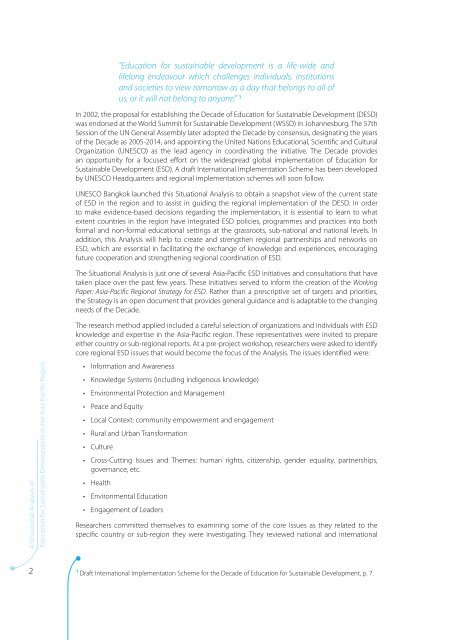A Situational Analysis - UNESCO Bangkok
A Situational Analysis - UNESCO Bangkok
A Situational Analysis - UNESCO Bangkok
Create successful ePaper yourself
Turn your PDF publications into a flip-book with our unique Google optimized e-Paper software.
“Education for sustainable development is a life-wide and<br />
lifelong endeavour which challenges individuals, institutions<br />
and societies to view tomorrow as a day that belongs to all of<br />
us, or it will not belong to anyone.” 1<br />
In 2002, the proposal for establishing the Decade of Education for Sustainable Development (DESD)<br />
was endorsed at the World Summit for Sustainable Development (WSSD) in Johannesburg. The 57th<br />
Session of the UN General Assembly later adopted the Decade by consensus, designating the years<br />
of the Decade as 2005-2014, and appointing the United Nations Educational, Scientific and Cultural<br />
Organization (<strong>UNESCO</strong>) as the lead agency in coordinating the initiative. The Decade provides<br />
an opportunity for a focused effort on the widespread global implementation of Education for<br />
Sustainable Development (ESD). A draft International Implementation Scheme has been developed<br />
by <strong>UNESCO</strong> Headquarters and regional implementation schemes will soon follow.<br />
<strong>UNESCO</strong> <strong>Bangkok</strong> launched this <strong>Situational</strong> <strong>Analysis</strong> to obtain a snapshot view of the current state<br />
of ESD in the region and to assist in guiding the regional implementation of the DESD. In order<br />
to make evidence-based decisions regarding the implementation, it is essential to learn to what<br />
extent countries in the region have integrated ESD policies, programmes and practices into both<br />
formal and non-formal educational settings at the grassroots, sub-national and national levels. In<br />
addition, this <strong>Analysis</strong> will help to create and strengthen regional partnerships and networks on<br />
ESD, which are essential in facilitating the exchange of knowledge and experiences, encouraging<br />
future cooperation and strengthening regional coordination of ESD.<br />
The <strong>Situational</strong> <strong>Analysis</strong> is just one of several Asia-Pacific ESD initiatives and consultations that have<br />
taken place over the past few years. These initiatives served to inform the creation of the Working<br />
Paper: Asia-Pacific Regional Strategy for ESD. Rather than a prescriptive set of targets and priorities,<br />
the Strategy is an open document that provides general guidance and is adaptable to the changing<br />
needs of the Decade.<br />
<br />
<br />
The research method applied included a careful selection of organizations and individuals with ESD<br />
knowledge and expertise in the Asia-Pacific region. These representatives were invited to prepare<br />
either country or sub-regional reports. At a pre-project workshop, researchers were asked to identify<br />
core regional ESD issues that would become the focus of the <strong>Analysis</strong>. The issues identified were:<br />
• Information and Awareness<br />
• Knowledge Systems (including indigenous knowledge)<br />
• Environmental Protection and Management<br />
• Peace and Equity<br />
• Local Context: community empowerment and engagement<br />
• Rural and Urban Transformation<br />
• Culture<br />
• Cross-Cutting Issues and Themes: human rights, citizenship, gender equality, partnerships,<br />
governance, etc.<br />
• Health<br />
• Environmental Education<br />
• Engagement of Leaders<br />
Researchers committed themselves to examining some of the core issues as they related to the<br />
specific country or sub-region they were investigating. They reviewed national and international<br />
<br />
1<br />
Draft International Implementation Scheme for the Decade of Education for Sustainable Development, p. 7.

















